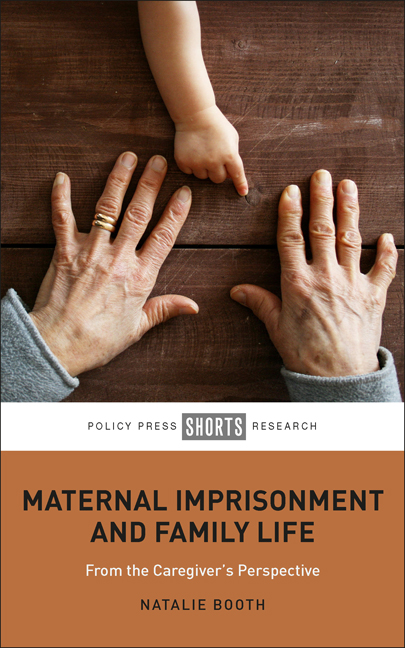Book contents
- Frontmatter
- Contents
- List of Tables
- Acknowledgements
- Preface: Linda’s Story
- One The Landscape of Maternal Imprisonment: Caregiving and Family Life
- Two Researching the Caregiver’S Lived Experiences
- Three Family Constructions and Caregiving Practices
- Four Renegotiating Family Life: Caregiving in the Aftermath of the Mother’S Imprisonment
- Five Navigating the Criminal Justice System
- Six Social Support, Familial Stigma and Release
- Seven Kin Caregiving: Occupying a Disenfranchised Status While Serving the Family Sentence
- Eight Reflections on the Research Process
- References
- Index
Five - Navigating the Criminal Justice System
Published online by Cambridge University Press: 10 March 2021
- Frontmatter
- Contents
- List of Tables
- Acknowledgements
- Preface: Linda’s Story
- One The Landscape of Maternal Imprisonment: Caregiving and Family Life
- Two Researching the Caregiver’S Lived Experiences
- Three Family Constructions and Caregiving Practices
- Four Renegotiating Family Life: Caregiving in the Aftermath of the Mother’S Imprisonment
- Five Navigating the Criminal Justice System
- Six Social Support, Familial Stigma and Release
- Seven Kin Caregiving: Occupying a Disenfranchised Status While Serving the Family Sentence
- Eight Reflections on the Research Process
- References
- Index
Summary
Introduction
All caregivers who participated in this study remained in contact with the imprisoned mother, and so their narratives offer an important opportunity to examine how caregiving kin can maintain relationships during maternal imprisonment. These insights are especially pertinent in light of – and in comparison to – the current political and policy climate, which has advocated support for prisoners’ family ties (MoJ and HMPPS, 2019a; see also Chapter One). Yet, contact with a person in prison is restricted and mediated by criminal justice policies and processes (HMIP, 2016). Therefore, this chapter focuses on the caregivers’ experiences of navigating the criminal justice system (CJS)as they followed the mother through court and into prison. There are four main sections:
Caregivers’ experiences of court processes, including the sequence of events and practices that followed the mother's removal into custody.
Caregivers’ opportunities for re-establishing contact with the mother on the telephone and face to face in the first days and weeks of her sentence.
Caregivers’ perceptions of maintaining contact with the mother on the telephone, via prison visits and through letter writing over time, as well as the role that technology could play in supporting this.
Caregivers’ understandings and perceptions of MBUs when a child in their family was housed in prison or awaiting confirmation of a place.
Court processes
There is limited understanding of how family members experience a relative's court case and the sequence of events that follow when a mother receives a prison sentence. Although the mother's journey into the criminal justice system begins at the point of arrest, caregivers’ stories tended to begin with the mother's trial at court because in nearly all of the families, this was the first time that they came into contact with the criminal justice system. In Chapter Three, it was clear how the custodial sentence was unexpected by most caregivers and therefore exceptionally emotional at this time. Building on this, it is important to understand how court practices were experienced and perceived by family members.
Court practices
Many of the caregivers accompanied the mother to court and witnessed the hearing from the public gallery. Primary kin caregivers had close relationships with the mother – as partner, parents or friends – and wanted to support her.
- Type
- Chapter
- Information
- Maternal Imprisonment and Family LifeFrom the Caregiver's Perspective, pp. 97 - 126Publisher: Bristol University PressPrint publication year: 2020



